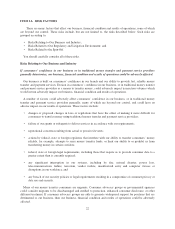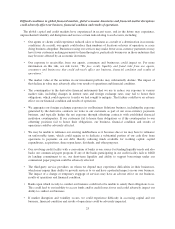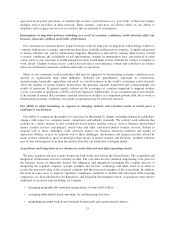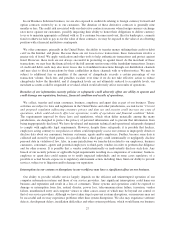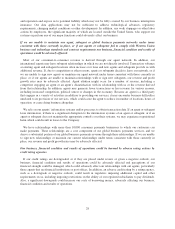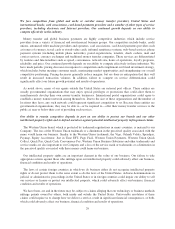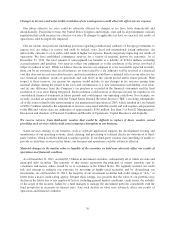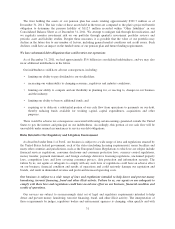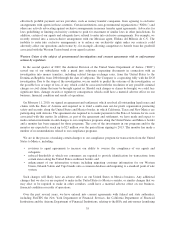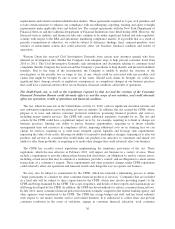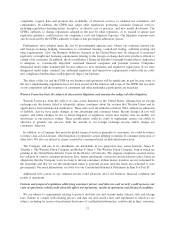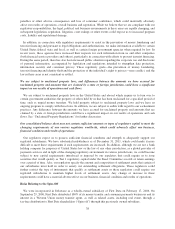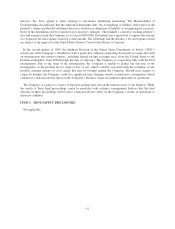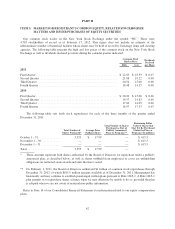Western Union 2011 Annual Report Download - page 39
Download and view the complete annual report
Please find page 39 of the 2011 Western Union annual report below. You can navigate through the pages in the report by either clicking on the pages listed below, or by using the keyword search tool below to find specific information within the annual report.little notice. Economic and trade sanctions programs that are administered by the United States Treasury
Department’s Office of Foreign Assets Control prohibit or restrict transactions to or from or dealings with
specified countries, their governments, and in certain circumstances, their nationals, and with individuals and
entities that are specially-designated nationals of those countries, narcotics traffickers, and terrorists or terrorist
organizations. As United States federal and state as well as foreign legislative and regulatory scrutiny and
enforcement action in these areas increase, we expect that our costs of complying with these requirements will
increase, perhaps substantially. Failure to comply with any of these requirements—by us or by our agents or their
subagents (each of whom are third parties over which we have limited legal and practical control) could result in
the suspension or revocation of a license or registration required to provide money transfer services, the
limitation, suspension or termination of services, the seizure and/or forfeiture of our assets and/or the imposition
of civil and criminal penalties, including fines.
We are subject to regulations imposed by the Foreign Corrupt Practices Act (the “FCPA”) in the United States
and similar laws in other countries, such as the Bribery Act in the United Kingdom, which generally prohibit
companies and those acting on their behalf from making improper payments to foreign government officials for
the purpose of obtaining or retaining business. Some of these laws, such as the Bribery Act, also prohibit
improper payments between commercial enterprises. Because our services are offered in virtually every country
of the world, we face a higher risk associated with FCPA and United Kingdom Bribery Act compliance than
many other companies. Any determination that we have violated these laws could have an adverse effect on our
business, financial condition and results of operations.
In addition, our United States business is subject to reporting, recordkeeping and anti-money laundering
provisions of the Bank Secrecy Act (“BSA”), as amended by the USA PATRIOT Act of 2001, and to regulatory
oversight and enforcement by the United States Department of the Treasury Financial Crimes Enforcement
Network (“FinCEN”). We have subsidiaries that are subject to banking regulations, primarily those in Brazil and
Austria. These subsidiaries are also subject to regulation, examination and supervision by the New York
Department of Financial Services. Under the Payment Services Directive (“PSD”) in the European Union
(“EU”), which became effective in late 2009, and similar legislation enacted or proposed in other jurisdictions,
we have and will increasingly become directly subject to reporting, recordkeeping and anti-money laundering
regulations. These laws could also increase competition in some or all of our areas of service.
The remittance industry has come under increasing scrutiny from government regulators and others in
connection with its ability to prevent its services from being abused by people seeking to defraud others. While
we believe our fraud prevention efforts are effective and comply with applicable law and best practices, the
ingenuity of criminal fraudsters, combined with the potential susceptibility to fraud by consumers during
economically difficult times, make the prevention of consumer fraud a significant and challenging problem. Our
failure to continue to help prevent such frauds or a change in laws or their interpretation could have an adverse
effect on our business, financial condition and results of operations.
Our fees, profit margins and/or foreign exchange spreads may be reduced or limited because of regulatory
initiatives and changes in laws, regulations and industry practices and standards that are either industry wide
or specifically targeted at our Company.
The evolving regulatory environment, including increased fees or taxes, regulatory initiatives, changes in laws,
regulations and industry practices and standards imposed by state, federal or international governments and
expectations regarding our compliance efforts, are impacting the manner in which we operate our business and
may change the competitive landscape and adversely affect our financial results. New and proposed legislation
relating to financial services providers and consumer protection in various jurisdictions around the world has and
may continue to affect the manner in which we provide our services, see risk factor “The Dodd-Frank Act, as
32


